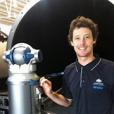
Analytical services
ANSTO has extensive nuclear analytical capabilities that can be applied to address broad range of challenges within the Resources sector.

Showing 281 - 300 of 392 results

ANSTO has extensive nuclear analytical capabilities that can be applied to address broad range of challenges within the Resources sector.


Role at ANSTO

The Imaging and Medical beamline (IMBL) is a flagship beamline of the Australian Synchrotron built with considerable support from the NHMRC. It is one of only a few of its type, and delivers the world’s widest synchrotron x-ray ‘beam’.

Role at ANSTO


ANSTO has agreed to participate in an Australian trial of a review of research infrastructure access proposals in which applicants remain anonymous to aid the removal of structural barriers to the career progression of Women in STEM.
Using the theory of compressed sensing technology, a team of physicists and scientists invented and developed the CORIS360® platform imaging technology. Compressed sensing imaging can generate an image with far fewer samples compared with traditional imaging techniques.


Matt Bell is a technical officer with a background in mechanical engineering. Matt started at ANSTO in 1993 as a Fitter & Machinist apprentice in the Engineering Workshop.

2025 ANSTO Work Experience Program will be open for applications in the new year.
Dr. Qinfen Gu leads the Powder Diffraction beamline team at the Australian Synchrotron, ANSTO, and serves as an Honorary Principal Fellow in the Department of Chemical Engineering at the University of Melbourne.


Soft x-rays are generally understood to be x-rays in the energy range 100-3,000 eV. They have insufficient energy to penetrate the beryllium window of a hard x-ray beamline but have energies higher than that of extreme ultraviolet light.


